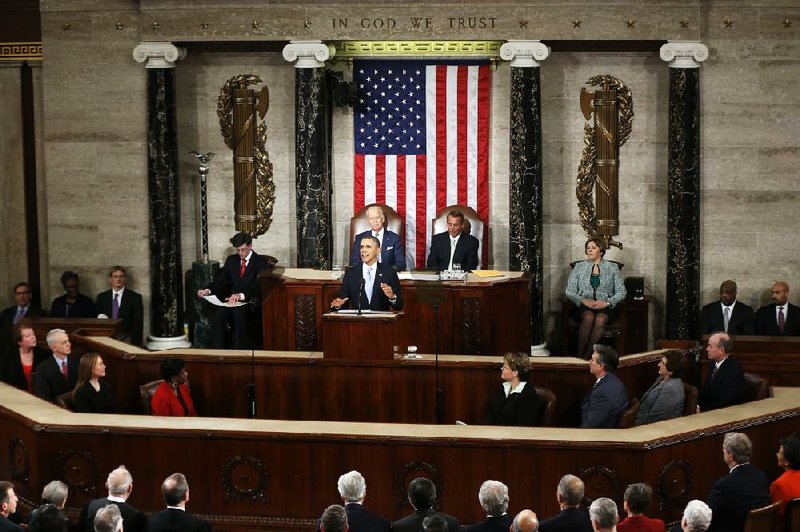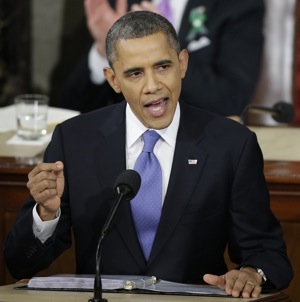WASHINGTON - President Barack Obama declared Tuesday night that he will not wait for Congress to act on reversing the tide of economic disparity, using his annual State of the Union address to outline a list of actions he will take without legislative approval.
RELATED ARTICLES
http://www.arkansas…">6 Arkansans see speech in a ruthttp://www.arkansas…">Obama’s proposalshttp://www.arkansas…">Excerpts from the speech
http://www.arkansas…">View the entire State of the Union address here.
In his speech, Obama vowed to confront growing economic inequality in America, saying upward mobility has stalled and that “too many Americans are working more than ever just to get by.” But as he laid out his agenda for the coming year, he challenged an often balky Congress to get on board or watch him take action on his own.
“America does not stand still - and neither do I,” Obama said in the speech, delivered to legislators and a national television audience from the chamber of the House of Representatives. Obama vowed to sidestep Congress “whenever and wherever” necessary to narrow economic disparities between rich and poor.
Obama said he plans to sign an executive order requiring that janitors, construction workers and others working for federal contractors be paid at least $10.10 an hour in the future, using his power to enact a more limited version of a policy that he has yet to push through Congress.
Among the president’s other executive initiatives is a plan to help workers whose employers don’t offer retirement savings plans. The program would allow first-time savers to start building up savings in Treasury bonds that eventually could be converted into traditional individual retirement accounts. Obama is expected to promote the “starter” accounts during a trip to Pittsburgh today.
The president also announced new commitments from companies to consider hiring the long-term unemployed; the creation of four “manufacturing hubs” where universities and businesses would work together to develop and train workers; new incentives to encourage truckers to switch from dirtier fuels to natural gas or other alternatives; and a proposed tax credit to promote the adoption of cars that can run on cleaner fuels, such as hydrogen, natural gas or biofuels.
He also said he wants to expand the earned-income tax credit, which helps boost the wages of low-income families through tax refunds. The White House said the tax credit encourages work and helps reduce poverty.
The minimum-wage order is meant to underscore an increased willingness by the president to act alone if lawmakers continue to resist his agenda, aides said. After a year in which most of his legislative priorities went nowhere, Obama is seeking ways to make progress despite a lack of cooperation on Capitol Hill.
Republicans fired back by blaming Obama’s policies for the country’s economic problems, but avoided the language of last year’s government shutdown to present what U.S. Rep. Cathy McMorris Rodgers of Washington called “a more hopeful, Republican vision.”
In her party’s official response, McMorris Rodgers denounced Obama’s health-care program, spending record and regulations. “Too many people are falling further and further behind because, right now, the president’s policies are making people’s lives harder,” she said.
“Republicans have plans to close the gap, plans that focus on jobs first without more spending, government bailouts and red tape,” McMorris Rodgers said. “We hope the president will join us in a year of real action, by empowering people, not making their lives harder with unprecedented spending, higher taxes and fewer jobs.”
The minimum-wage plan provides an example of what Obama has in mind. He called on Congress during last year’s State of the Union address to raise the minimum wage for workers across the board, only to watch the proposal languish on Capitol Hill, where opponents argued that it would hurt businesses and stifle job creation. With prospects for congressional action still slim, Obama is using the executive order covering federal contractors to go as far as he can on his own.
“You can be sure that the president fully intends to use his executive authority to use the unique powers of the office to make progress on economic opportunity, to make progress in the areas that he believes are so important to further economic growth and further job creation,” said Jay Carney, the White House press secretary.
But the minimum-wage order also illustrates the limits of that approach. If Congress increases the federal minimum wage to $10.10 from $7.25 as Obama has sought, 17 million employees would eventually get raises unless their jobs were eliminated, and another 11 million would benefit indirectly as wage ladders were adjusted, according to estimates by the Economic Policy Institute, a liberal research organization.
Obama’s order, by contrast, will affect relatively few at first, because it will apply only to new or renewed contracts. Even down the road, at most it might affect several hundred thousand workers.
Republicans quickly panned the executive initiative as ineffective.
“The question is how many people, Mr. President, will this executive action actually help? I suspect the answer is somewhere close to zero,” House Speaker John Boehner said.
White House officials said they hoped the order would put pressure on Congress to follow through with across the-board legislation, sponsored by two Democrats - Sen. Tom Harkin of Iowa and Rep. George Miller of California. And they argued that even without success in Congress, the president’s decision to raise the issue over the past year has helped encourage several states to increase the minimum wage within their borders.
But some of the president’s liberal supporters complained that he did not go far enough and should have applied the wage increase to existing federal contract employees.
“This action, while a step forward, suggests he may still be unwilling to take the fighting stance necessary to deliver the big wins over growing inequality that our country desperately needs,” said Jim Dean, chairman of Democracy for America, an advocacy group founded by his brother, former Gov. Howard Dean of Vermont.
Similarly, J. David Cox Sr., national president of the American Federation of Government Employees, praised Obama’s action but said he should apply it to the government’s own employees.
“If the president is to have any credibility in talking about living wages, he needs to get his own house in order first and do everything in his power to establish $10.10 as the minimum wage for all federal hourly workers,” Cox said.
Obama’s vow to use his executive authority more robustly has drawn criticism from Republicans who say he has already stretched and, in some cases, exceeded the bounds of his power, much as he once accused President George W. Bush of doing.
Among other things, Obama unilaterally deferred deportation of many younger illegal aliens after Congress declined to pass legislation giving them legal status. He has delayed enforcement of several aspects of his disputed health-care law. He declined to defend against legal challenges to the Defense of Marriage Act, a law barring federal recognition of same sex marriages that was later in part overturned by the Supreme Court.
As he looks ahead to three more years in office, and with Republicans likely to still control one if not both houses of Congress, Obama has sought other ways of enacting his agenda.
Republicans argued that if Obama genuinely wanted to improve the economy, he should find ways to roll back his health-care program, approve the proposed Keystone XL pipeline, rally Democrats to support trade negotiating authority and pressure allies in the Senate to take up job-creation bills passed by the Republican House.
“We’ve had a years-long clinic on the failures of liberalism,” Sen. Mitch McConnell of Kentucky, the Republican leader, said on the Senate floor Tuesday. “The government stimulus, the taxes, the regulations, the centralization, the government control - it just hasn’t worked.” Hesaid the problem was not the message. “It never has been. It’s the policies themselves.”
Obama’s speech Tuesday night was his fifth formal State of the Union address - his speech to Congress in early 2009 did not technically qualify. The president, who is reeling in the polls after a year of setbacks, aimed to use the moment to re-establish his command of Washington before midterm elections this fall and, after that, the presidential primaries consume public attention.
The economy and other domestic issues, including health care, dominated the president’s address. He touched only briefly on foreign policy, touting the draw down of American troops from Afghanistan this year and reiterating his threat to veto any new sanctions Congress might levy on Iran while nuclear negotiations with the Islamic republic are underway.
To reinforce his messages, carefully selected guests sat with Michelle Obama in the first lady’s box. Among them were to be Cristian Avila, a young alien spared from deportation by the president’s executive action; Mary Barra, the chief executive of General Motors, whose company has rebounded since a federal bailout approved by Obama; Gov. Steve Beshear of Kentucky, a Democrat who has worked to implement the Obama health-care program; and Amanda Shelley, a physician assistant from Arizona who received coverage under the health-care program on Jan. 1, just a day before needing emergency abdominal surgery.
To counter that, Boehner, R-Ohio, invited the presidents of four businesses from his home state of Ohio who he said are struggling because of Obama’s health-care law: Joe Brown of Hartzell Propeller; Wayne Deschambeau of Wayne HealthCare; Laura Doerger-Roberts of Vinylmax Windows; and David Lippert of Hamilton Caster & Manufacturing.
When it came to rebutting Obama’s national address Tuesday night, Republicans had four different approaches from four different corners of the party’s ideological wings.
In addition to the official response by McMorris Rodgers, Rep. Ileana Ros-Lehtinen, R-Fla., the most senior Hispanic Republican, was expected to hew closely to McMorris Rodgers in the Spanish-language response to Obama.
Meanwhile, Sen. Mike Lee, R-Utah, delivered a speech sponsored by Tea Party Express, one of the constellation of conservative groups that have flourished in the past four years. An architect of the strategy to shut down the federal government in a bid to thwart Obama’s health-care law, Lee comes from the far right corner of his party, both on fiscal and social policy.
Seizing on Democrats’ complaints about income equality, Lee focused on inequality driven by the government and said he shared the frustration of Americans with “an ever-growing government that somehow thinks it is OK to lie to, spy on and even target its own citizens.”
“Americans know in their hearts that something is wrong. Much of what is wrong relates to the sense that the ‘American Dream’ is falling out of reach for far too many of us,” Lee planned to say. “We are facing an inequality crisis - one to which the president has paid lip-service, but seems uninterested in truly confronting or correcting.”
Finally, Sen. Rand Paul, R-Ky., videotaped a response to be distributed on Facebook, YouTube and other media outlets. A potential 2016 presidential contender, Paul has become the nation’s leading libertarian politician.
Paul, in his speech, said, “Government spending doesn’t work. It doesn’t create jobs.” He said the key to economic growth is lower taxes. Information for this article was contributed by Peter Baker of The New York Times; by Paul Kane, Robert Costa and Peyton Craighill of The Washington Post; and by Brady McCombs, Julie Pace, Josh Lederman, Jim Kuhnhenn, Nedra Pickler, Donna Cassata and Hanry C. Jackson of The Associated Press.
Front Section, Pages 1 on 01/29/2014

